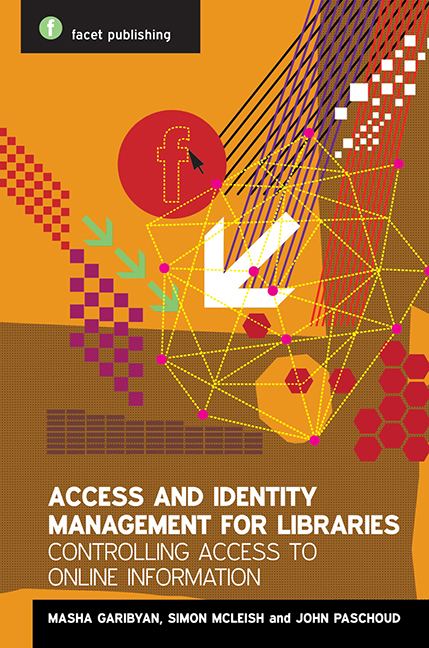Book contents
- Frontmatter
- Contents
- Foreword
- Acknowledgements
- Note to readers
- Glossary
- 1 What is access management, and why do libraries do it?
- 2 Electronic resources: public and not so public
- 3 Principles and definitions of identity and access management
- 4 Current access management technologies
- 5 Authentication technologies
- 6 Authorization based on physical location: how does the internet know where I am?
- 7 Authorization based on user identity or affiliation with a library: who you are? Or what you do?
- 8 Federated access: history, current position and future developments
- 9 How to choose access management and identity management products and services
- 10 Internet access provided by (or in) libraries
- 11 Library statistics
- 12 The business case for libraries
- Afterword
- Appendix 1 Case studies
- Appendix 2 A White Paper on Authentication and Access Management Issues in Cross-organizational Use of Networked Information Resources
- Index
10 - Internet access provided by (or in) libraries
Published online by Cambridge University Press: 10 September 2022
- Frontmatter
- Contents
- Foreword
- Acknowledgements
- Note to readers
- Glossary
- 1 What is access management, and why do libraries do it?
- 2 Electronic resources: public and not so public
- 3 Principles and definitions of identity and access management
- 4 Current access management technologies
- 5 Authentication technologies
- 6 Authorization based on physical location: how does the internet know where I am?
- 7 Authorization based on user identity or affiliation with a library: who you are? Or what you do?
- 8 Federated access: history, current position and future developments
- 9 How to choose access management and identity management products and services
- 10 Internet access provided by (or in) libraries
- 11 Library statistics
- 12 The business case for libraries
- Afterword
- Appendix 1 Case studies
- Appendix 2 A White Paper on Authentication and Access Management Issues in Cross-organizational Use of Networked Information Resources
- Index
Summary
Increasingly, an important function served by public libraries (and university or other libraries that offer access to the public) is that of ‘internet café’. Users are not drawn by any information resources that are physically within the library, but by the availability of access (often free of charge) to the internet. What should libraries be aware of when providing internet access, and what technologies can they use to manage such access appropriately?
Introduction
History of library-based internet access
There have been libraries offering online services since before the internet became a global phenomenon; the author of this chapter had his first introduction to the online world through the MIST MUD role-playing game (better known as Essex MUD), accessible from Essex University through a terminal hooked up to a modem in a tiny room in an Oxford college library via the earliest JANET service in early 1988, a service available free between 2 a.m. and 8 a.m. (Laurie, 2003).
However, the availability of such services through libraries remained sporadic in the UK for some time, essentially being offered in academic libraries and only to institutional members. This began to change at the end of the 1990s, as the internet itself became part of mainstream culture. ‘In 1997, only 5 per cent of libraries had internet access. By 1999, this had risen to 41 per cent; in 2004, it was 67 per cent’ (reported at www.politics. co. uk/ reference/public-libraries, source unknown); 100% for static (as opposed to mobile) service points was reached by 2008, with an overall level of 6 terminals available per 10,000 of the UK population (Department of Culture, Media and Sport, 2008, 6) and over 95 million internet accesses taking place from public libraries in 2011 (CIPFA, 2011).
Online access from academic libraries is also an important part of higher education culture. In 2011, electronic resources accounted for 26% of library expenditure by member libraries of SCONUL (see Glossary), in addition to spending on internet access and computer equipment by institutions as a whole; there were 288 terminals available per 10,000 FTE students, and 38% of library seats offered laptop access (SCONUL, 2011).
- Type
- Chapter
- Information
- Access and Identity Management for LibrariesControlling Access to Online Information, pp. 113 - 126Publisher: FacetPrint publication year: 2014



